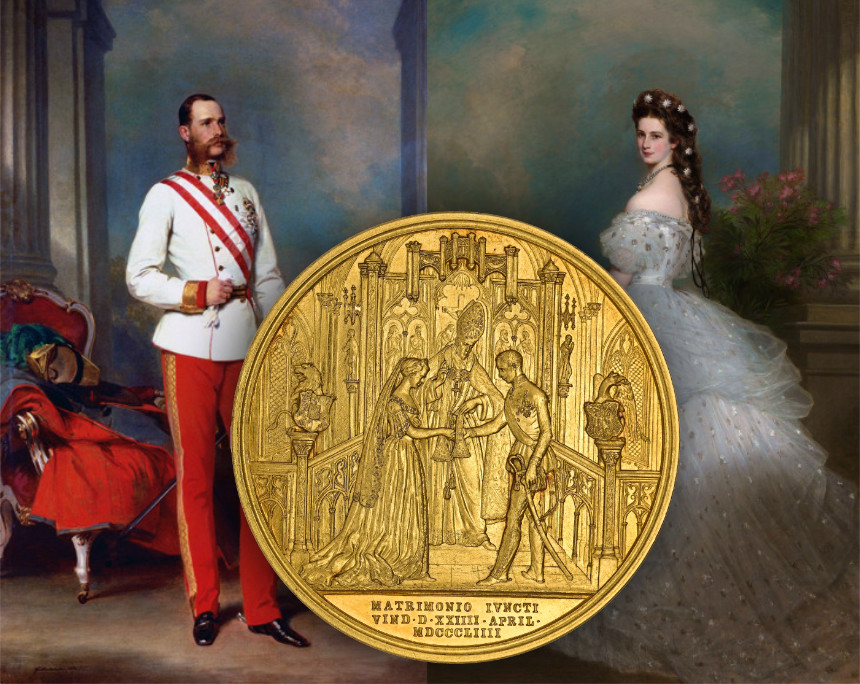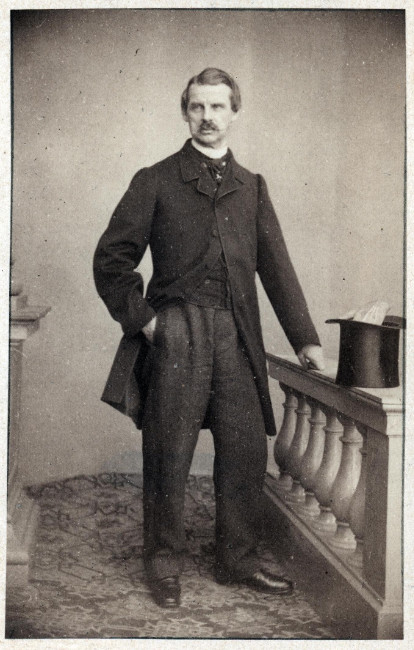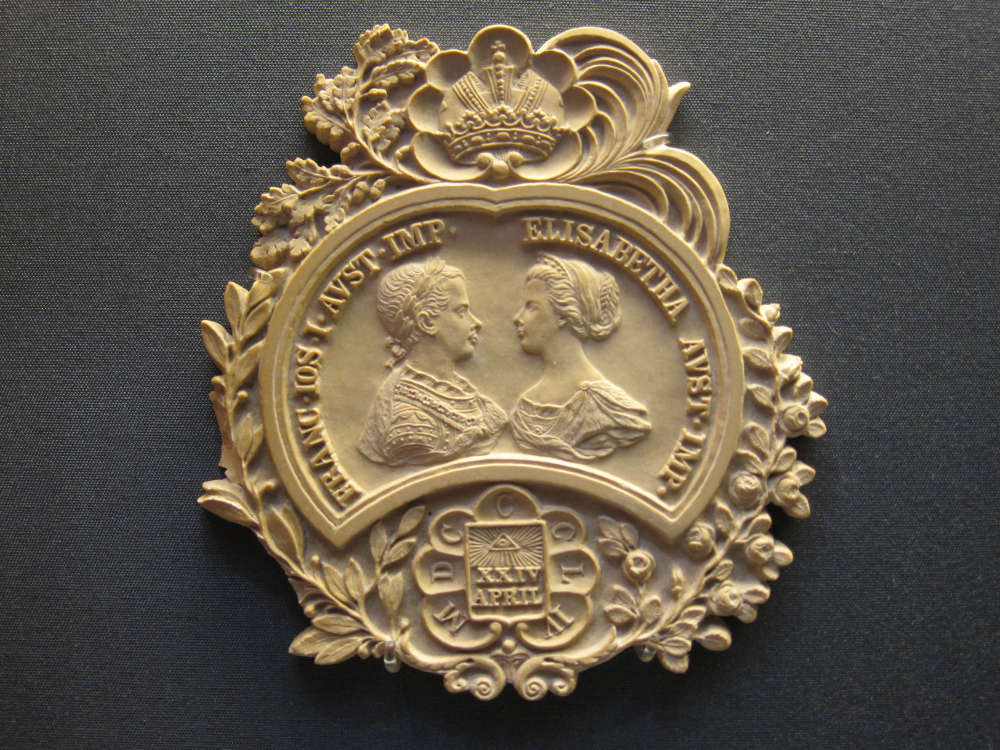Sisi and Franz: Commemorating the Dream Wedding that Was Actually a Nightmare
by Ursula Kampmann on behalf of Künker
As part of the phaleristic auction 415 on 28 October 2024, Künker will be auctioning the set of gold medals that Emperor Franz Joseph presented to his father-in-law, Duke Maximilian Joseph in Bavaria. It is the numismatic souvenir of a wedding that turned out to be a nightmare for his daughter – young Elisabeth, who is better known as Sissi or Sisi today.
Content
On Saturday, 22 April 1854, at 4 p.m. on the dot, the paddle steamer Franz Joseph docked at Nussdorf near Vienna to the sound of celebratory gunfire and shouts of “vivat”. On board was a frightened 16-year-old, struggling to keep her composure. Dressed in pink silk, she stood and waved with her lace handkerchief at the cheering crowd that was eager to catch a glimpse of their future empress. Tens of thousands of people crowded along the riverbanks and streets, peering out of windows and from stands, just to cast a glance at the future ruler of their country. The latter let all the speeches and greetings, all the poems and tributes wash over her without complaint before the procession of carriages finally formed to take the entire court to Schönbrunn.

Official commemorative set with two gold medals with the weight of 35 ducats each from the estate of Max Joseph in Bavaria, the father of Empress Elisabeth of Austria-Hungary. Estimate: 40,000 euros. From Künker auction 415 (28 October 2024), No. 361.
Sisi’s Loving Father
Let us take this opportunity to look at the family who was marrying off their daughter in Vienna. Duke Max Joseph in Bavaria, the bride’s father, sat in the first open two-horse carriage with the bridegroom. Many people still think of him as he was portrayed by Gustav Knuth in Hubert Marischka’s legendary “Sissi” movies – as a loving father and the archetype of cozy Bavarian “Gemütlichkeit”.
In fact, Duke Max Joseph in Bavaria was anything but “gemütlich”, although he liked to play the zither. He came from the younger branch of the Wittelsbach family, and had an immense income, which he spent on his pleasures. It was not necessary for him to work in such circumstances. He had been forced to marry Ludovika, and he made sure she knew it. He fathered children with her at regular intervals and otherwise did as he pleased. He maintained a small stage and a circus ring in his residence, where he himself occasionally appeared as a clown. Max Joseph traveled a great deal and when he was in Munich, he usually stayed with his non-aristocratic second family. He was much closer to his three illegitimate children than to Elisabeth and her siblings.
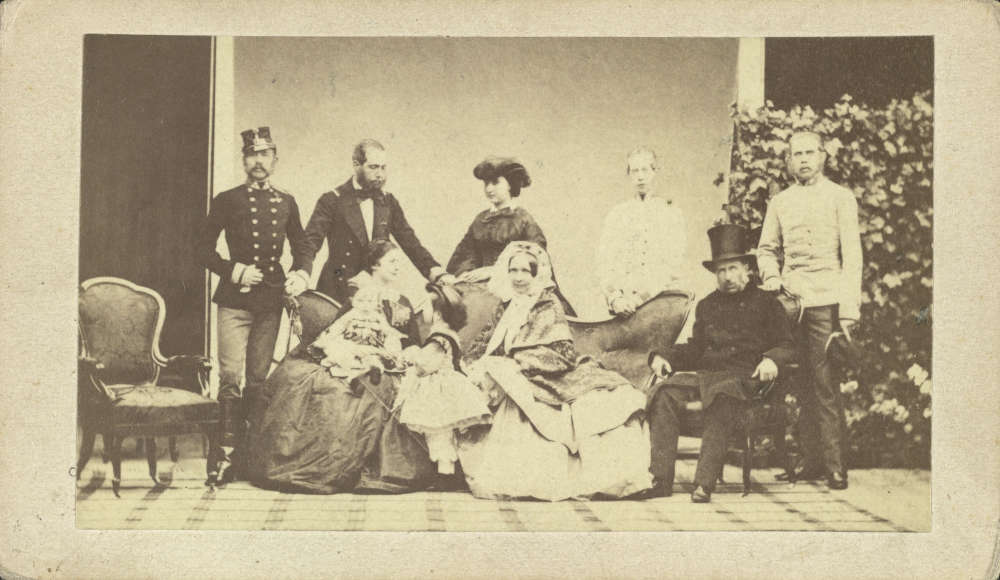
The imperial family. Front row from left to right: Elisabeth with her children Rudolf and Gisela, Sophie and her husband Archduke Franz Karl of Austria. Second row from left to right: Maximilian (of Mexico), Emperor Franz Joseph, Charlotte, Maximilian’s wife, the Archdukes Karl Ludwig and Ludwig Viktor. Photo taken by Ludwig Angerer c. 1860.
The Evil Mother-in-Law
The bride waved from the following carriage. Proudly seated beside her was Empress Mother Sophie, who is stylized in the Marischka movies as a truly evil mother-in-law. In fact, Sophie is more like the secret heroine of the story, and today we would rather speak of her as a strong woman.
Sophie Friederike was Ludovika’s sister and therefore a real aunt of Elisabeth in Bavaria. In her day she was considered one of the most beautiful women in Germany: Ludwig I had her immortalized for his “gallery of beauties”. At the age of 19, Sophie married Franz Karl of Austria, the emperor’s younger son. Not of love, of course. Her big moment came in the revolutionary year of 1848, when Emperor Ferdinand was forced to abdicate. Sophie ensured that her son, not her husband, would ascend the throne, and his youthfulness won the hearts of the people.
Sophie had brought up her son in a dutiful and arch-conservative manner. While his bride was completely overwhelmed by the festivities of the wedding week, the 24-year-old managed to take care of the daily affairs of the state at the same time. Neither he nor his mother would have been able to understand what following the rules of court ceremonial demanded of Elisabeth. She may have had an excellent upbringing, but discipline and affability had not been part of her curriculum at Possenhofen Castle.
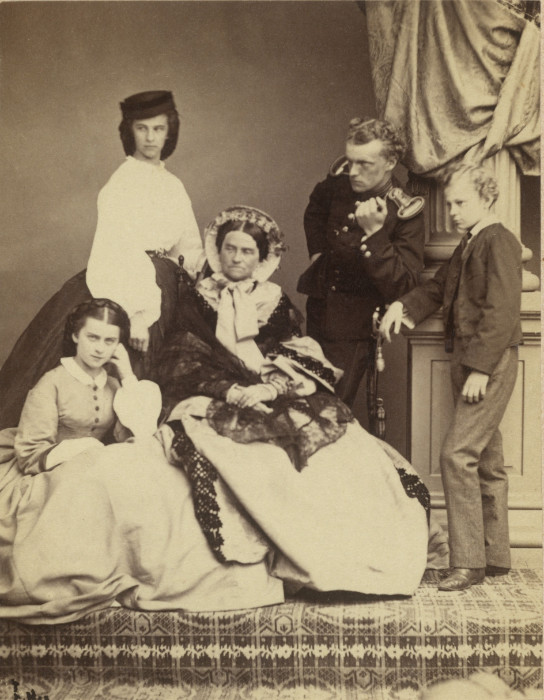
Ludovica surrounded by some of her children, from left to right: Sophie, Mathilde, Carl Theodor and Maximilian. Photo taken by Hermann Holz c. 1860.
Sisi’s Dutiful Mama
The bride’s mother, Ludovica, sat next to Archduke Franz Karl in the third carriage. One might wonder whether she smiled on this rare occasion. She never did. And that should not be a surprise. She had not been happy in life. She too had loved and been loved. She would have happily accepted the hand of the King of Portugal, but her father would not have it.
So she was left with an absent husband and a growing number of children. What she lacked in tenderness, she made up for with a passionate love for her dogs.
She could not bear to stay in her husband’s Munich palace. As soon as spring arrived, she and her children moved to Possenhofen and stayed there as long as the weather permitted. This meant that Sisi and her siblings were little accustomed to the city and even less to court ceremonies. It did not help that Ludovika hired the best teachers for her children. Her proficiency in mathematics, geography and history did not help her daughter to move confidently in Vienna’s highest society. Disaster was inevitable.
Arrival in Vienna and an Accident
It is hard to imagine how tired little Sisi must have been when, after the gala dinner, she fell into bed well after midnight on the evening of her arrival. She was not allowed to sleep in the next day. After all, the move to Vienna was on the agenda. First she had to get dressed – a rather complex procedure – to then make the short journey from Schönbrunn to the Theresianum. There she was dressed up even more elaborately. Elisabeth now wore a scratchy rosé gown with silver touches, a crinoline and a long train embroidered with garlands of roses. A high tiara balanced on her head, threatening to slip off with the slightest movement. We know that the exhausted girl in the glass coach cried from the moment she got in until the moment she got out. The people cheering in the streets were treated to the spectacle of a hysterical, red-eyed princess, crying her eyes out and unable to pull herself together. As she stepped out of the carriage, her tiara got caught on something and she would have fallen if a servant had not caught her. All this in front of the entire court that had gathered to welcome her to the residence. This certainly must have caused even more tears…
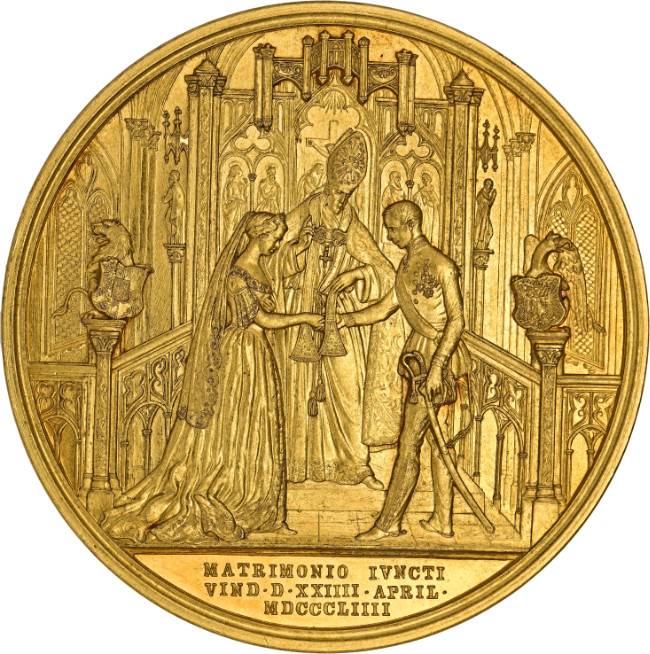
Reverse of the wedding medal, whose dies by Konrad Lange had been produced on behalf of the Vienna Principal Mint. They depict the couple while receiving the blessing.
The Wedding Ceremony
Elisabeth was allowed to sleep in the next day. At least we hope so. It would be understandable if she did not manage to get a wink of sleep in the night before the wedding. The church wedding was scheduled for 6.30 p.m. It took place in the Augustinian Church, which was lit by 15,000 candles. The ceremony was performed by the Vienna Archbishop Rauscher, who can be seen between the couple on the medal created by Konrad Lange for the wedding. He was assisted by 70(!) bishops and prelates. Archbishop Rauscher – nicknamed “Plauscher”, which translates to “the chatty one”, for his loquaciousness – gave everyone a masterclass in endurance with his sermon.
But the wedding itself was only the beginning of the festivities. The newlyweds now had to endure the congratulations of the entire elite of the Habsburg Monarchy. Everyone who was anyone had traveled to this celebration and crowded into the halls of the Hofburg. At some point the overwhelmed Elisabeth could no longer stand it. She rushed out of the hall, wept profusely in an adjoining room, while the perplexed royal household did not know how to handle the situation. Eventually they managed to get Elisabeth back, but then the next problem arose: Elisabeth was shy and had never seen so many people in one place before. Of course she could not say a single word. But given her high rank, nobody else was allowed to start a conversation with her – unless she spoke fist. So everyone stood in awkward silence until Princess Esterhazy, who had been appointed as Elisabeth’s chaperone, took heart and, breaking the rules, asked a few ladies to direct some words at the Empress.
But of course, this reception was not the end of the festivities. Next were festive illuminations, and the young couple’s carriage was driven through the streets of Vienna for hours on end so they could admire them. Only then did the wedding feast begin, with endless speeches and shouts of “vivat”. There was no energy left for the wedding night. We know this because the next morning both mothers interrupted the couple’s breakfast to find out whether Elisabeth had become a woman. (She had not. Sources say that she did not become one until the third night of her marriage.)
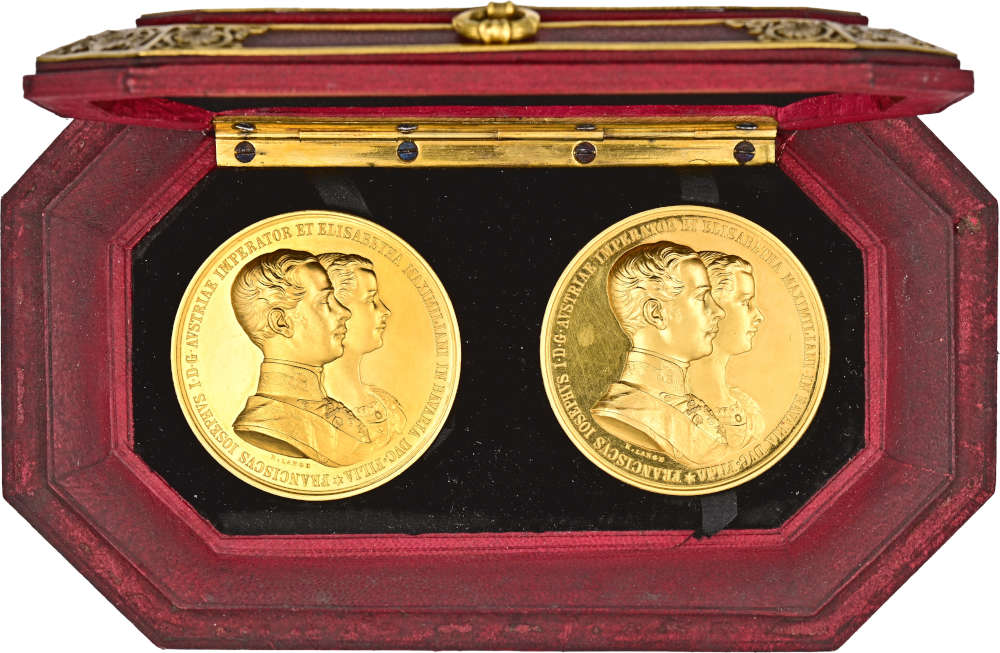
Official commemorative set with two gold medals with the weight of 35 ducats each from the estate of Max Joseph in Bavaria, the father of Empress Elisabeth of Austria-Hungary. Estimate: 40,000 euros. From Künker auction 415 (28 October 2024), No. 361.
A Souvenir for the Participants
Our description of the wedding celebration ends here, but they were far from over for Elisabeth. She had to endure a play and a court ball, a folk festival and the town ball. It was a kind gesture on the part of her young husband that, on the fourth day, he canceled the exhausting receptions in order to take his wife for a ride through the Prater – this time in an inconspicuous carriage driven by the Emperor himself, which could be covered by a canopy so that the occupants could not be seen.
He must have realized that otherwise Elisabeth would not have been able to go through the festivities without a nervous breakdown. After all, they had to maintain their imperial image. It was a disaster for the Emperor that tens of thousands of people had seen how unhappy his bride was before the wedding. Her tears must not be seen in the official media. In those pictures and reports, she had to shine – as she did on the official wedding medal that had been commissioned from the Vienna Principal Mint long before the actual event.
The court required such medals for all major festivities, to be distributed as souvenirs to the participants. Careful consideration was given to the position and rank of the recipient. The bride’s father, Max Joseph in Bavaria, naturally received a first-class commemorative set. It contained two heavy gold medals in the weight of 35 ducats each, which is 122.2 or 122.3 g. They were presented in a small box made of red maroquin leather, lavishly decorated with brass applications.
In terms of uniqueness and exclusivity, such a set cannot be compared with the unboxed medals struck with the same dies, which are more frequently found at auction. They are available in gold, silver and bronze, although the Vienna Principal Mint only produced bronze medals for sale. Silver and gold medals were only used as gifts, but if the administration had miscalculated their orders and there were too many medals, they could be given to interested citizens who were prepared to pay a high premium. They were not, of course, delivered as a magnificent commemorative set in an elaborately designed box. Such objects were only created for high guests.
The Künker auction house in Osnabrück is proud to offer this memorabilium in auction 415.
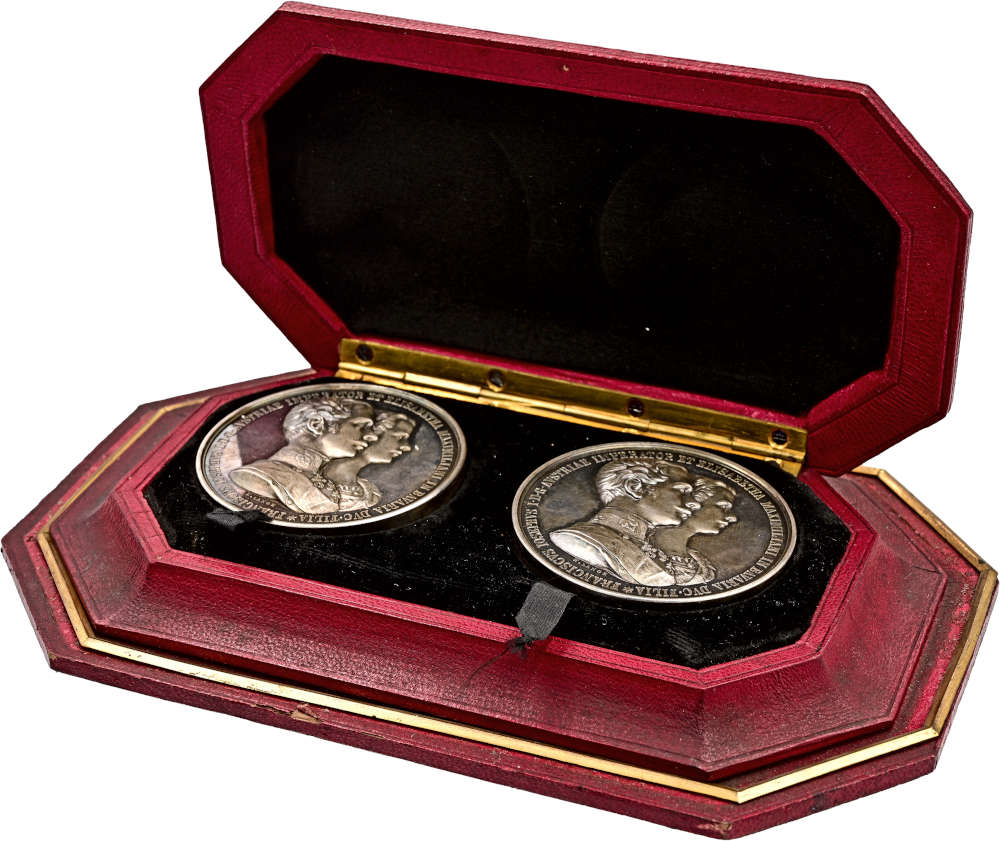
Official commemorative set with two silver medals from the estate of Carl Theodor in Bavaria, the brother of Empress Elisabeth of Austria-Hungary. Estimate: 4,000 euros. From Künker auction 415 (28 October 2024), No. 362.
Sisi’s Favorite Brother “Gackerl” Carl Theodor in Bavaria
Auction 415 includes not only the official commemorative set given to the bride’s father, Max Joseph in Bavaria, but also a second set in silver that belonged to Sisi’s favorite brother. Carl Theodor was a year and a half younger than Elisabeth and was nicknamed “Gackerl” (little rooster) by her. Along with all her siblings, he accompanied her through the week’s festivities, but had to rejoin the Royal Bavarian 3rd Chevau-légers immediately afterwards. The 14-year-old had been serving as sub-lieutenant in this regiment since the 12 October 1853. Sisi was so distraught by his departure that within a week she begged her husband to make Gackerl come to Vienna for a few days. Franz Joseph agreed, making his young wife very happy. The close relationship between the two sibling was to last for many years and was passed on to their children.
After the death of his father Max Joseph on 15 November 1888, Carl Theodor became head of the House of Wittelsbach in Bavaria. In this capacity, he inherited the gold commemorative set that his father Max Joseph had received from Emperor Franz Joseph, together with many other Wittelsbach memorabilia. Ulrich Künker comments: “We are very honored to be auctioning a selection of important items from the estate of Carl Theodor and his remarkable wife Marie José of Braganza. It was both an honor and an imperative for us to document the objects in this estate as well as possible and to place them in their historical context.”
The catalog of auction 415 compiled by Michael Autengruber can be ordered from Künker, Nobbenburger Straße 4a, 49076 Osnabrück; phone: +49 541 / 962020; fax: +49 541 / 9620222; or via e-mail. There you will also find additional information about the remarkable life of Carl Theodor in Bavaria and his wife Marie José.







